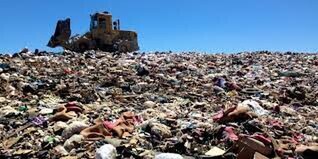Black Friday: Are you dying of consumption?
If you are anything like me, you have an inbox quickly filling with marketing emails for Black Friday, not to be confused with Friday the 13th. True to the name, Black Friday sales are the coal smudge of retail marketing, clogging our inboxes and minds with messages about how buying new stuff will make us happy. Messages that fool us into thinking we’re getting a deal, on an item we didn’t know we needed.
Black Friday sales are a lazy, yet profitable retail marketing strategy, that disrespects customers, communities, and the environment alike. I would argue that they are also a breach of Te Tiriti o Waitangi because the Crown is allowing a flood of low-quality and irreparable goods into the country without any ethical consideration of the impact on land, water, air, and wellbeing.
In their collective submission to the Ministry for Environment “Taking Responsibility for our Waste” Para Kore responded that “The capitalist economic system and eurocentric epistemological framework that was established by the colonial government, is the perpetrator of the environmental destruction we seek to address. The structures and values embedded within these are inherently at odds with the changes necessary to prevent further environmental degradation.”
Recent research from Britain shows that up to 80% of products bought in Black Friday sales, are recycled poorly and end up in landfill or are incinerated. Less than a third of electronic waste caused by Black Friday is recycled or re-homed. As a nation we already understand that landfills are problematic, we cannot increase them and to regenerate our natural resources and ecological systems we need to move away from landfill or incineration as a solution to waste.
The problem is we keep consuming, discarding, and consuming again. It’s how our capitalist system works, and the only winners are the holders of private wealth.
When I was a child if anyone coughed my Nan would ask them if they were dying of consumption. It seems we are and have been we are taking the life of the planet with us. Consumption was the European name for tuberculosis from the 18th - 20th century, the name 'consumption' arose from the idea that the body was being consumed as the sufferer wasted away. The people who died from consumption were predominately poor people and women...
The only solution to this is to stop the extraction and over-production of low-quality, low-cost goods, and to respect the resources we already have.. We need to innovate and create new infrastructure to circularise our economies and systems. We need to look at planetary boundaries and environmental capacity alongside the waste hierarchy and Te Tiriti o Waitangi. The Crown has an obligation to partner with Māori so that we can collectively work towards a vision of a zero-waste, climate-neutral Aotearoa.
Black Friday is a symptom of a broken economic system, one that has perverted value theory for destructive consequences and policy as gains. This includes war and pollution. Creating pollution contributes to GDP, however, the remedial and protection work of indigenous peoples, volunteers, and community organisations does not. By rethinking waste as a resource we can redesign an economic system and develop our own theory of value. If GDP is a system of value theory that has served its purpose, a tool of industrialisation and manufacturing, and the pipe dream that is unlimited growth, then Black Friday is the last gasp of purposeless production.
Investigating the systems that underpin our western way of life is an essential ingredient of looking back in order to understand the change we need for transformational wellbeing solutions.
Manu Taki Voice: Jo Wrigley, Manager of Go Eco and Manu Taki for SDG 1/2 and 13
November 23, 2022


